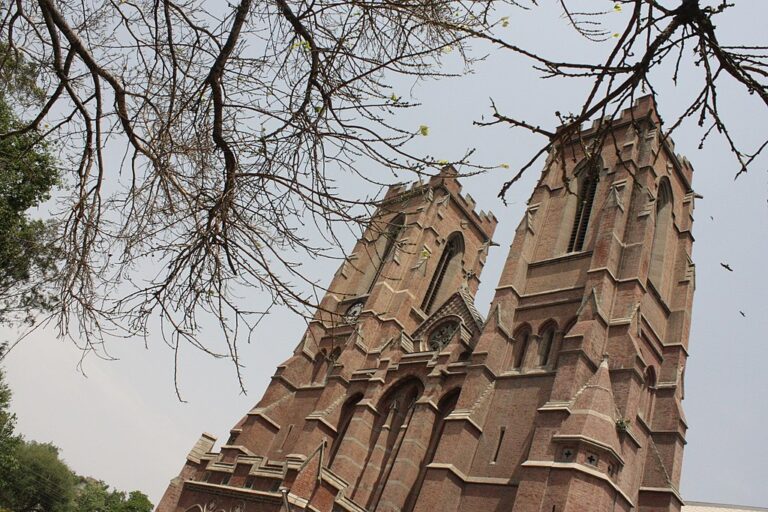
The church union in Pakistan, formed in 1970 through the merger of several Protestant denominations, is on the verge of collapse due to a bitter dispute between the Diocese of Lahore and the Synod of the Church of Pakistan following the ‘election’ of the Lahore bishop, church sources said.
The Church of Pakistan (CoP) has split deeply since its Lahore Diocese elected Reverend Nadeem Kamran as its bishop in January allegedly in violation of the constitution and election rules of the Synod, the premier supervisory body of the CoP. The Synod rejected the election, terming it “unconstitutional and illegal” and refused to accept Kamran as a bishop.
Sources said that efforts for conciliation between the two sides had suffered a major setback after the Diocese of Lahore reiterated in a letter addressed to the Registrar Joint Stock Companies Lahore that it was “a fully autonomous body, which is legally, legislatively, administratively or otherwise free from control of any Church, Council, Synod or any other Society external to itself”.
The Diocese of Lahore made the admission in response to applications submitted by representatives of all dioceses of the Church of Pakistan for the deregistration and non-renewal of the Constitution of the Lahore Diocesan Council on the grounds that it is contrary to the Constitution and Rules of the Church of Pakistan.


Commenting on the stance taken by the Lahore Diocesan Council, Church of Pakistan’s spokesperson Reverend Emmanuel Khokhar said the Lahore diocese constitution, in its present form, disrespects the Synod of the Church of Pakistan by undermining the pledge made on All Saints Day, 1970, according to which the union was declared to be irrevocable and indissoluble.
“In light of this pledge, the Lahore Diocesan Council’s letter to the Registrar is detrimental to the unity and integrity of the Church of Pakistan,” Rev Khokhar told Kross Konnection.
READ MORE: Church of Pakistan schism widens over bishop’s controversial election
He said that the CoP Synod led by its Moderator Bishop Azad Marshall had proposed conciliatory talks to save the church union, but some elements in the Diocese of Lahore were thwarting the efforts by refusing to accept the authority of the Synod.
“The Constitution of the Church of Pakistan clearly states that the Synod is the supreme supervisory and legislative body of the church. The constitution also empowers the Synod to ensure that constitutions of all diocesan councils are in conformity with the rules of the Church of Pakistan,” he emphasised.
Rejecting the Lahore diocese’s claim that no individual or organisation had challenged its constitution since its registration on Sept 30, 1996, Rev Khokhar claimed that this was the first time the anomalies in the diocesan constitution had come into the knowledge of the Synod as all previous elections, including the election of former Lahore Bishop Irfan Jameel, had been conducted under the CoP’s rules.
“The Synod and bishops of the other seven dioceses came to know about the contentious clauses in the constitution at the time of the election of the Lahore bishop. Upon inquiry, we found out that a majority of diocesan officials had never seen the constitution. This act of secrecy exposes the ill intent of the handful of people who have been at the helm of affairs in the diocese for decades and are now responsible for the current crisis,” he said.
Rev Khokhar added that despite the rigid attitude of the Lahore diocese, the Synod was still eager to save the church union.
“The Lahore diocesan bishop will not have any legitimacy till the time he is elected and consecrated by the Synod in accordance with the rules of the Church of Pakistan. Therefore, we urge the diocesan officials to reconsider their stance instead of playing into the hands of some individuals who are bent upon breaking the church,” he said.
He added that the Synod’s conflict resolution committee headed by Bishop Marshall and comprising Deputy Moderator and Bishop of Hyderabad Kaleem John and Bishop of Multan Leo Roderick Paul were ready to hold conciliatory talks with the Lahore diocese.
READ MORE: Court takes action in Lahore bishop’s election controversy
“We have invited the elected diocesan officials to meet with the committee on April 12, but they have not yet responded to the invitation,” he said, adding that the Church of Pakistan’s partners, particularly the Archbishop of Canterbury, were “very concerned” about the situation.
“Both the Archbishop of Canterbury and the Anglican Consultative Council have already expressed their concern over the manner in which the Lahore diocese has digressed from the constitution of the Church of Pakistan,” he said.
Repeated attempts were made to contact Lahore Diocesan Bishop Nadeem Kamran and Diocesan Secretary Samina Bhatti but they neither responded to phone calls nor text messages sent to them in this regard.
Observers believe the collapse of the church union in Pakistan would be a significant blow to the country’s Christian community, which already faces significant challenges in a predominantly Muslim country. It would also have a negative impact on the wider global Christian community, which has long seen the Church in Pakistan as an important symbol of unity and cooperation between different denominations.
Lahore diocese is no one’s family property it is and will always be part of all the dioceses and Synod that is the supreme body and evil retireds who tried to damage church unity must be punished for taking this stupid, unconstitutional and greedy step. Retired Bishops ki yeh badmashi nahi chaley ge. Once a retired always known to be retired. Illegal Nadeem kamran is not our bishop, he is a thief and a robber. People will give a severe response if they do not stop doing their illegal acts. May God do justice and the church authority restore lahore diocese back to its original status and save it from retired thieves.